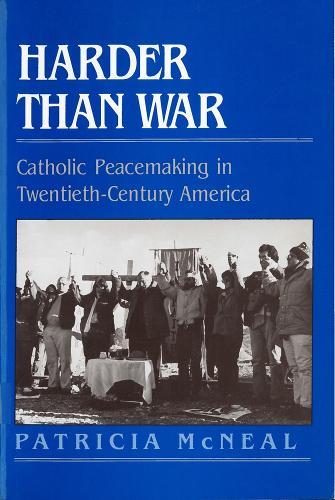Overview
Patricia McNeal's comprehensive study of American Catholic peacemaking in the twentieth century documents the growth of pacifism and nonviolence within the American Catholic community, and assesses its impact on the church and the nation.McNeal begins with the first official Catholic peace organization in the United States, the Catholic Association for International Peace, founded in 1927. An elitist lay organization supported by the church hierarchy, the CAIP based their opposition to war on the ""just war"" doctrine. With the emergence of pacifism among American Catholics in 1930s, Dorothy Day, co-founder of the Catholic Peace movement, added to the Catholic theological agenda the concepts of pacifism, conscientious objection, and nuclear pacifism. Dorothy Day and the Catholic Worker movement became the midwife in the formation of other Catholic peace organizations such as PAX, the Catholic Peace Fellowship, and PAX Christi-USA during the Vietnam War. Members of these groups cooperated with the broader peace movement in the United States. Their main focus became opposition to nuclear warfare and nuclear weapons. During the Viet Nam War, Catholic Workers burned their draft cards and turned from nonviolence to resistance by practicing civil disobedience. Daniel and Philip Berrigan escalated that resistance when they destroyed draft files, and symbolically poured blood over and hammered nuclear weapons to awaken the national conscience to the life-ending effects of nuclear warfare.McNeal concludes that Catholic peacemakers had the greatest impact not on the government but on the institutional church. In 1971 the American hierarchy judged that the Vietnam War was not a ""just war."" For the first time in the United States, and possibly in history, a national hierarchy announced as unjust a war being waged by its own nation.
Full Product Details
Author: Patricia F. McNeal
Publisher: Rutgers University Press
Imprint: Rutgers University Press
Dimensions:
Width: 15.20cm
, Height: 2.30cm
, Length: 22.90cm
Weight: 0.426kg
ISBN: 9780813517407
ISBN 10: 0813517400
Pages: 344
Publication Date: 01 February 1992
Recommended Age: From 18 to 99 years
Audience:
College/higher education
,
General/trade
,
Undergraduate
,
General
Format: Paperback
Publisher's Status: Active
Availability: Out of stock

The supplier is temporarily out of stock of this item. It will be ordered for you on backorder and shipped when it becomes available.
Reviews
""More than a history of a movement, this book tells the stories of some of those men and women in the Catholic community who have helped bring the U.S. church into a highly visible role of peacemaking."" -- Thomas J. Gumbleton, Auxiliary Bishop of Detroit ""McNeal narrates the tortuous search for a Catholic approach to peace.... This is an original and comprehensive history... [it] belongs in every library on peace movement history and Catholic social thought."" -- Charles Chatfield, Wittenberg University ""A valuable and highly significant work. It is the definitive account of the growth of pacifism... among American Catholics and of the impact of the peace movement on the Roman Catholic church in the United States in the twentieth century."" -- John W. Chambers, Rutgers University ""McNeal demonstrates a broad understanding of contemporary Roman Catholicism and of the historical context of its development.... This is an impressive book."" -- David J. O'Brien
A valuable and highly significant work. It is the definitive account of the growth of pacifism... among American Catholics and of the impact of the peace movement on the Roman Catholic church in the United States in the twentieth century. --John W. Chambers, Rutgers University McNeal demonstrates a broad understanding of contemporary Roman Catholicism and of the historical context of its development.... This is an impressive book. --David J. O'Brien McNeal narrates the tortuous search for a Catholic approach to peace.... This is an original and comprehensive history... [it] belongs in every library on peace movement history and Catholic social thought. --Charles Chatfield, Wittenberg University More than a history of a movement, this book tells the stories of some of those men and women in the Catholic community who have helped bring the U.S. church into a highly visible role of peacemaking. --Thomas J. Gumbleton, Auxiliary Bishop of Detroit
Author Information
Patricia McNeal is an Associate Professor of History at Indiana University at South Bend.



